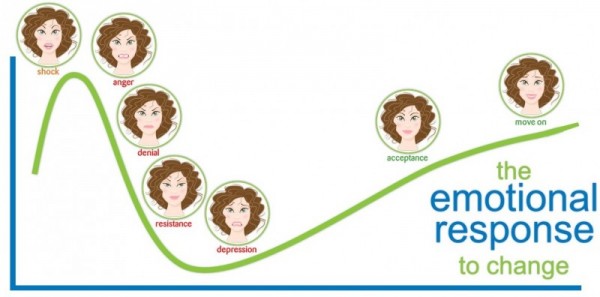What happens to people when change happens?
We are in a rapidly changing world and as a result the pace of change in work and life is quick. If people choose to change then the emotions can be positive and motivational. However much change is out of people’s hands and control.
This includes changes such as:
- Restructuring
- Downsizing and Redundancy
- Implementing new technology
- Culture Change
- Leadership Change
As people are all unique individuals it is both difficult to assess what is considered a small change and what is considered to be a substantial life changing change. People all deal with change differently. Choosing to change is completely different to having change imposed on an individual. Imposed change is not only life changing but also emotional.
The emotions an individual will go through when faced with a change are outlined below.
Shock / Anger
Initially people need to time to recognise what is happening. For a time people may appear to do nothing or very little – perhaps not even coping. A range of reactions may be experienced or observed of others. For Instance in a restructuring / redundancy situation it can manifest itself as extreme reactions including; angry outbursts, some people become speechless and numb whilst others feel the need to escape what is happening. It is a highly stressful stage.
An explanation for this:
- Not having control
- Not wanting change
- In a routine
- Fear of the unknown
Denial
Denial is a common stage. People often think it will “go away” so they carry on as if nothing has changed. This is common in individuals who have worked in an organisation for a number of years. For instance in a restructuring / redundancy situation this means that some people carry on with their jobs as normal, like it isn’t really happening. Often people in a redundancy situation carry on doing their role right to the last minute.
An explanation for this:
- Not wanting change
- In a routine
- Fear of the unknown
Resistance
People then go through a period of frustration. They recognise that they need to move on but do not know how to, often clinging onto what they feel comfortable with and resisting anything that may be new.
Feeding the resistance will be:
- Fear of the unknown
- Fear of losing status through having to start again
- Fear of getting it wrong and appearing stupid
- Loss of our network of contacts i.e. our friends and colleagues
e.g. in a restructuring / redundancy situation this is when people fight what is happening to them often challenging the reasons, coming up with proposals to avoid job losses. Also people refuse to look for new jobs or to accept careers help and support.
Depression / Sadness
People start to realise that change isn’t going away. This can make people feel depressed or sad that things have changed. For some people it is a real depression which can take years to recover from.
Feeding this sadness will be:
- Sad to leave the old world
- Sad to lose colleagues and friends
- Wanting things to go back to before
Acceptance/ learning to cope
People move on into the new world. They let go of old attitudes and behaviours that were comfortable and useful in the past. They begin to test new ways of doing things, they learn from trial and error. There will still be moments of frustration when new skills are not quite fluent. This phase represents a person’s move psychologically, into their own personal learning cycle. People begin to experiment actively and get involved.
For instance in a restructuring/ redundancy situation people begin to focus on their individual futures and either start to learn a new job within the organisation or start to look for a new job outside the organisation. There is a more positive energy in this phase.
Moving on
People move on as they become increasingly comfortable and competent at operating in the new changed environment. Their self-esteem begins to rise. For instance, in a restructuring/ redundancy situation people begin to obtain jobs / interviews and begin to feel that there is light at the end of the tunnel.
People consolidate their identity in their new roles either within the organisation or outside. In particular people work out how they fit into the new scheme of things. For instance in a restructuring/ redundancy situation people begin to look forward to the new future and feel motivated by the new challenge.
People now feel comfortable and competent once again. They have ceased to compare it, positively or negatively with the old situation before the change.
Some people need lots of support, other people appear to cope. It’s completely personal and individual.
The difference between people is the rate they go through the stages in the change process.
Some people move through the stages very quickly, some people get stuck at the first stage or the first few stages.
Time to reflect
How do you respond to change? Do you recognise these emotional responses to change?
| Print article | This entry was posted by Denise on June 25, 2015 at 5:47 pm, and is filed under Managing Change. Follow any responses to this post through RSS 2.0. Both comments and pings are currently closed. |
Comments are closed.





